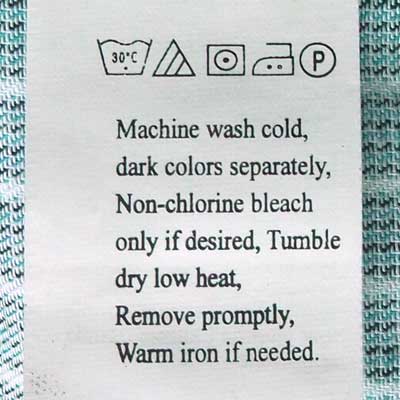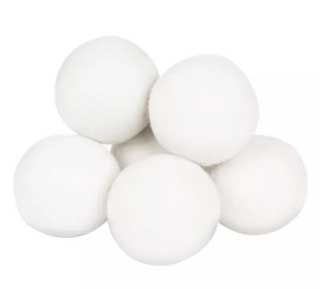When you first purchased the blanket, it was nice, soft, and fluffy. But after using it for a while and some washing cycles – It seems to have lost its original soft and fluffy magic. Just what happened? What is causing this tragedy?
- Too much detergent, unwashed residue makes the fabric stiff.
- Too little detergent, unable to counter the hard water (minerals in water).
- High heat can melt synthetic blankets and cause damage.
- Harsh chemicals can also harden and/or deteriorate the fabric.
- Otherwise, it could just be regular wear-and-tear of the blanket.
No need to despair. If you have done things wrong, just follow up with the proper washing techniques to prevent further damage. There may still be hope in restoring that softness, read on to find out!
TABLE OF CONTENTS
 Proper Washing Proper Washing |
 Proper Drying Proper Drying |
 The End The End |
PROPER WASHING

I can totally understand, some people just wash their blankets with the rest of the laundry load for sake of convenience… But this may also be where the problem lies.
READ THE CARE INSTRUCTION!

First things first, I cannot stress this enough. Some fabrics require special care, it ends up coarse and raspy exactly because it is washed in the wrong way. If you put a “machine wash cold” blanket into hot water, you are doing it wrong. If you are using high heat to dry a “tumble dry low heat” blanket, you are doing it wrong.
So please read the wash or care instructions if you have not done so, it should be attached somewhere on the blanket. If there is no instruction, here is a quick “estimate list” for the general fabrics used to make blankets:
- Cotton & wool – Cold or warm water, but never hot. Hot will likely cause them to shrink.
- Synthetics (nylon, polyester, acrylic) – Preferably cold or lukewarm. Avoid high heat, that can melt synthetic fabrics. Bleach is not recommended.
- Silk & Satin – Cold or lukewarm. Do not machine wash, will probably tear. No bleach, gentle detergent only.
TOO MUCH OR TOO LITTLE DETERGENT

If you have been following the care instructions, then it’s probably a simple mistake of too much or too little detergent.
- Too much detergent will leave a lot of soap residue. This will cause the blanket to feel hard and coarse… Often powdery.
- Too little detergent will also leave the blanket stiff. Basically, minerals in the water leave “hard water stains” on the blanket, and there is not enough detergent to counteract.
How much detergent is too much, and how little is too little? That is a very difficult question to answer. Every brand of detergent has a different concentration, every location has a different water source. So it’s pretty much a matter of using the recommended amount indicated on the bottle and estimating how much to “adjust” by yourself.
ADD SOFTENERS & CONDITIONERS, JUST NOT TOO MUCH.
Some people may have thought – If the blanket is stiff, we simply add more softener to smooth it out. Please don’t. Using too much softener will have a reverse effect instead. As most laundry experts have warned, softeners work great, but they are no good in huge amounts or in the long run. Essentially, what will happen if there is an “overdose” of softener:
- They will get stuck to the blanket, and cannot be washed off. This causes the blanket to attract dust and dirt more easily.
- The excessive softener also turns into sludge in the washing machine.
- The fabric gets damaged because of “clogged pores”.
- Some softeners are also known to contain not-so-healthy chemicals.
If you have to use softeners, do so sparingly – Just add a little bit. Also, don’t mix them with detergent. The washing machine should have separate slots for detergent and softener.
ALTERNATIVES TO SOFTENERS
Softeners are not good in the long term, but thankfully, many people have shared a ton of alternatives online. While the effectiveness of all those methods remains to be verified, here are 2 that I have tried and seem to work just fine.
- Baking soda – Supposedly offers a similar effect as fabric softener but has none of those harmful side effects. Add half a cup in during the rinse cycle.
- Vinegar – Not pure vinegar. Those stink real bad and are way too acidic. Use one cup of distilled white vinegar during the rinse cycle, add a few drops of essential oil to mask the smell.
If you want more alternatives, I shall leave a link at the end of this guide… Or just do a “softener alternative” search on the Internet.
PROPER DRYING

So far so good? If the washing part is done right, that should have solved half of the issue. The other half is to properly dry out the blanket.
USE THE RIGHT TEMPERATURE
Captain Obvious to the rescue again, follow the care instruction. Don’t use high heat on fabrics that cannot withstand it, especially for synthetic materials (nylon, polyester, acrylic)… Damaged fabrics can be difficult or impossible to fix – Synthetic fabric melt when exposed to high heat, and that is where the “hardness” is coming from.
ADD SOME BALLS

Not just any balls, but laundry dryer balls. These things may seem simple, but they really soften up the blankets and laundry a fair bit.
P.S. Some people will recommend throwing some tennis balls into the dryer, but I also remember a video where someone had an unfortunate experience with it. The tennis balls “shed color” and turned an entire load of laundry into lime green. Yes, just go get yourself some good white balls instead.
THE END

Thank you for reading, and we have come to the end of this short guide. I hope it has helped to answer solve your stiff blanket woes. Good luck and have better nights of sleep!
LINKS & REFERENCES
- How To Keep Blankets Soft – Downy
- Prevent clothes from getting stiff – Beko
- Top 10 Fabric Softener Alternatives – Home Stratosphere
- Laundry is stiff or hard after washing – AEG
- How to Restore Softness to Stiff Garments – How To Clean Stuff

